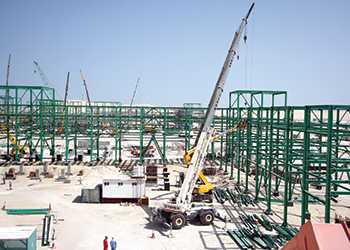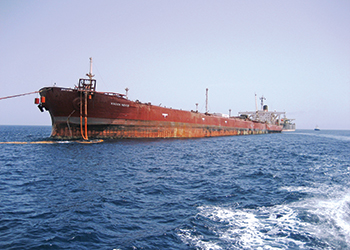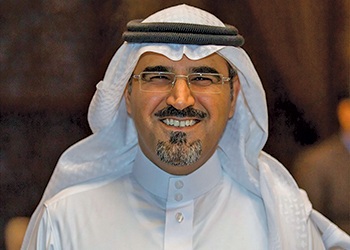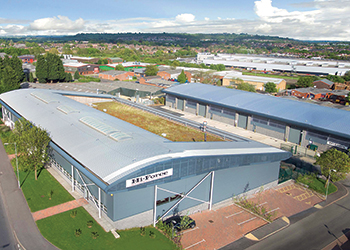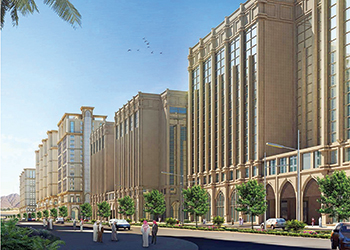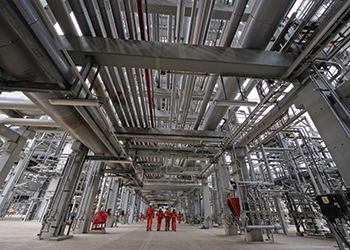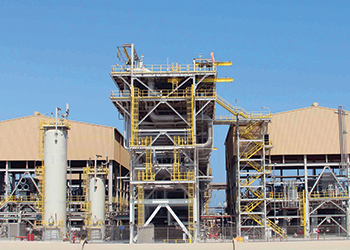
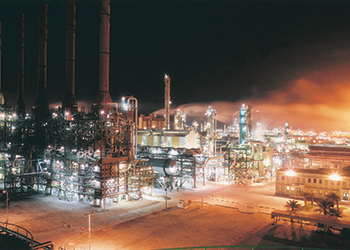 Qatar Petroleum ... downstream focus
Qatar Petroleum ... downstream focus
Plans are afoot to invest $25 billion in petrochemical capacity to produce 23 million tonnes by 2020 from 16.8 million tonnes in 2012. As well as raising production capacity, investments are aimed at broadening the range of petrochemical products on offer
Qatar, the world’s largest liquefied natural gas (LNG) producer, is diversifying its exports away from the oil and gas sector and is already the second largest exporter of chemicals in the Gulf, representing 17 per cent of total Gulf Cooperation Council’s (GCC) chemical exports.
Countries such as Qatar are using their supplies of energy to widen their industrial bases and boost exports of non-energy goods such as chemicals with petrochemicals and refining activity making up 40 per cent of manufacturing output, according to the Ministry of Development Planning and Statistics.
Plans are afoot to invest $25 billion in petrochemical capacity to produce 23 million tonnes by 2020 from 16.8 million tonnes in 2012, Energy Minister Mohammed Al Sada says. As well as raising production capacity, investments are aimed at broadening the range of petrochemical products on offer.
However Industries Qatar (IQ), the state-controlled petrochemicals and steel producer, revealed in September that it was putting on hold the Al Sejeel plant, construction of which was due to start by early next year. Also, Shell and state-owned Qatar Petroleum have scrapped plans to build a petrochemical plant in Qatar because of high capital costs and sinking oil prices.
The companies signed a memorandum of understanding in December 2011 to conduct a feasibility study into building the plant at the Ras Laffan Industrial City in Qatar.
The Al-Karaana plant was estimated to cost in excess of $6 billion and involved constructing a world-scale ethane-fed steam cracker, a 1.5 million mtpa monoethylene glycol plant, a 300,000 mtpa linear alpha olefins plant, and a 250,000 mtpa oxo alcohol unit.
The venture, between Qapco and state energy company Qatar Petroleum, was one of two petrochemical plants scheduled to be constructed before the end of the decade. IQ said it is studying 'a new downstream petrochemical project that is expected to yield better economic returns'.
The petrochemical complex was one of several high-profile projects to be signed this year, to make up contracts worth an estimated $40 billion.
The petrochemicals industry has embarked on a long-term expansion plan based on the assumption that demand from China and other emerging markets such as India will continue to grow, according to a report by corporate consultants Dun & Bradstreet.
Qatar Petroleum International (QPI), a subsidiary of Qatar Petroleum, has struck a series of agreements over the past few years to develop petrochemicals production projects in Vietnam and Singapore, among others.
These projects will see Qatar provide feedstock for other offshore developments and help the country expand its profile along the Asian supply chain.
Khalid Al Subaey, chief coordinator for Mesaieed Petrochemical Holding Company (MPHC), a subsidiary of Qatar Petroleum, says prospects for petrochemicals producers are positive in the medium term, helped by rising demand and the slow pace of new capacity being brought on line in North America.
The rise in demand for high-density polyethylene, the most commonly-used plastic in packaging and bottles, has been consistently above global GDP growth for some time, a trend that is expected to continue, Al Subaey says.
'The strongest demand growth is from Asia, and in particular, China,' he says. 'While China’s high density polyethylene demand growth rate is expected to slow somewhat over the next five years, it is still expected to be above 6 per cent. China’s continued growth coupled with relatively few new capacity additions is expected to drive increasing exports, especially from the Middle East.
 |
Al Sada ... drawing up investment plans |
As part of the push into Asia, Qatar Chemical and Petrochemical Marketing and Distribution Company (Muntajat), the state-owned energy distributor which holds the rights to market, sell and distribute Qatar’s chemical and polymer products globally, announced in mid-October the opening of offices in eight Asian hubs, along with an office in Morocco to serve the North African market. Two of the new Asian offices will be in China – located in the industrial centres of Guangzhou and Shanghai – and one in India’s Mumbai. The others will be in Thailand, Sri Lanka, Philippines, Indonesia, and Pakistan.
Since its launch in 2012, Muntajat has experienced rapid growth and has quickly become a regional and global player in the chemical and petrochemical industry.
'In 2013 alone, Muntajat managed to ship around 8 million tonnes of chemicals, polymers and fertilisers to more than 120 countries around the world. This year, we are on target to reach 10 million tonnes. On top of that, we have managed to transition 90 per cent of Qatar’s production to our portfolio and are looking to complete the full transition by the end of 2014,' said Muntajat’s CEO Abdulrahman Ali Al Abdulla.
These are impressive achievements for a company that has yet to reach its second anniversary. Muntajat has benefited heavily from the Qatari government’s pledge to spend $25 billion on its downstream sector.
There are a number of large scale projects under way which will significantly strengthen Muntajat’s hand over the coming years.
Qatar is also in the process of developing one of the world’s largest greenfield port development, which will be equipped to handle the world’s largest tankers. With the US emerging as a key competitor for Asian markets, the new ports will be Qatar’s lifeline to their customers in the Far East.
Muntajat has signed a two-year contract to lease the LPG carrier The Almarona from Milaha. The deal will see Muntajat take sole use of the 23,000 cubic metre capacity gas carrier specifically for exports to the Far East.
Qatar’s ability to hit its target of 23 million tonnes of petrochemical and fertiliser exports will rest squarely on the shoulders of the successful completion of these projects, leaving little room for error. Al Abdulla remains optimistic about the projects’ progress in Qatar.
'These new projects will broaden Muntajat’s portfolio and position Qatar in a more competitive position when it comes to production volume. Muntajat will play a critical role in the marketing, sales and distribution of the products of each of the new projects once complete. We are developing our global marketing and distribution capabilities in line with the capacity growth to ensure the ability to deliver as these new projects come online,' he explains.
One of Muntajat’s key challenges has been developing new markets for Qatar’s increased production of petrochemicals, polymers and fertilisers. This year has seen the company opening new offices in Amman, Melbourne, Cape Town, Kuala Lumpur and Istanbul in an attempt to reach out and develop new markets.
In late 2014 Muntajat also opened an international marketing headquarters in The Hague, Holland, as well as 11 additional global marketing offices around the world. It is intended that these offices will serve more than 40 markets around the world.
'The international outlook for the industry is positive and challenging at the same time. We are closely monitoring the US and Chinese markets as they develop their production capabilities. The US with shale gas and China with coal, but we still believe that Qatar and the Middle East will continue to have the feedstock advantage due to the abundance of oil and gas reserves,' he says.
 |
Al Abdulla ... greater quality of service |
'We also foresee continuous growth for polymers. As the quality of life improves around the world, especially in Africa and Asia, it will continue to have a positive impact on the consumption of plastics and packaging,' Al Abdulla explains.
Muntajat is forecasting an increase in demand across its product range. Significant growth is expected in demand for fertilisers as developing markets look to increase and secure their food supply. To capitalise on these opportunities and meet the global growing demand, Muntajat is focused on building its global reach by establishing its network of offices in key markets.
Qatar’s National Vision 2030 calls for a sustainable and prosperous future for its citizens. Part and parcel of this drive will be increasing the number of Qatari nationals who are employed by its key industries. The refining and petrochemicals sector will be no exception, and Muntajat has plans in place to invest in the training and development of its staff.
'The Qatari National Vision 2030 is about economic, human, social and environmental development. As a global business, we are of course contributing to the economic development of the State, particularly as it diversifies beyond oil and gas. But we see our contributions going much deeper than purely economic measures. Developing national human capital is an important area of focus for Muntajat.'
Muntajat has developed the Muntajat Integrating Nationals Development (MIND) programme which caters to recent graduates looking to enter the downstream industry.
'For decades, Qatar has been home to a thriving chemicals and petrochemicals sector, qualifying talented individuals with local and global expertise. Muntajat is the success it is today because of our commitment to bring together global and local expertise, a roadmap we will continue to follow in the future,' notes Al Abdulla.
At a senior level, Muntajat comprises 60 per cent Qatari nationals. Across the company Qatarisation has reached a total of 22 per cent for all employees.
As Qatar continues to sharpen its focus on high value, refined products, Muntajat will be crucial to its success. Al Abdulah remains upbeat about Qatar’s ability to deliver on its ambitious targets.
'What we know is that the global petrochemicals market remains strong and Qatar has a well-respected, long-standing history of successful products and a very loyal customer base. The establishment of Muntajat grants Qatar a more competitive position through new efficiencies and scale. Muntajat welcomes regional and international competitions. We believe it drives greater quality of service,' he says.
Meanwhile, diversified business activities support Qatar Petroleum in expanding its businesses into different verticals and mitigating business risks. Along with integrated energy operations, the company also carries out various other businesses such as production and sale of fertilisers, steel, aluminium, underwriting insurance, chartering of helicopters and other services. It operates fertiliser business through Qatar Fertiliser Company (Qafco), with total production capacity of 3.8 million tonnes per annum (mtpa) of ammonia and 5.6 mtpa of urea. It is the fourth largest producer of urea and the largest exporter in the world.
The company operates an integrated petrochemical plant through Qatar Chemical Co. (Q-Chem), a joint venture between QP and Chevron Phillips Chemical Company, with production capacity of 36,000 mtpa of sulphur, 500,000 mtpa of ethylene, 453,000 mtpa of high density polyethylenes (HDPE) and 47,000 mtpa of 1-Hexene.
It produces methanol and methyl tertiary butyl ether (MTBE) through a joint venture, Qatar Fuel Additives Co (Qafac), with production capacity of 983,330 tpa of methanol and 610,000 tpa of MTBE. Through Qatar Vinyl Co (QVC), it produces intermediates in the PVC industry. QVC has production capacity of 730,000 mtpa of caustic soda liquid, which is used in the manufacture of paper, soap, and detergents and has industrial applications. It carries out the production of heavy-duty plastic bags, sheets and other plastic products through Qatar Plastic Products Co (QPPC), for industrial purposes from polyethylene produced in Qatar.










































































